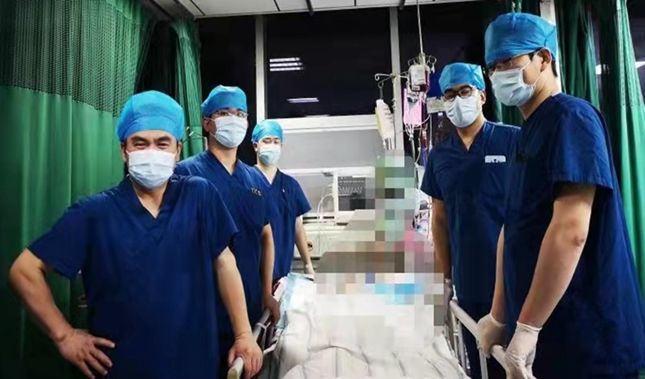
The 17-year-old girl was in a deep coma for two days after taking a whole bottle of medicine. “Donate organs to extend my daughter’s life”. In order to fight for the last chance, Xian Chunlan, the organ coordinator who used to be the “passenger of life”, urgently contacted the medical and nursing team of the Department of Critical Care Medicine II of the People’s Hospital of Wuhan University (Hubei Provincial People’s Hospital), and joined hands to miraculously awaken young lives.
On the morning of April 4, during the Qingming holiday, Xiaoyu (pseudonym)’s mother found her daughter lying on the ground in a state of confusion and reluctance. After being rushed to the local hospital for rescue, Xiaoyu had convulsions all over his body, followed by sudden breathing and cardiac arrest. After emergency CPR, although his heart rate returned to normal, he was still in a deep coma, unable to breathe on his own, and could only be maintained by taking vasopressors. blood pressure. The local hospital has repeatedly issued critical illness notices to the family.
Seeing that there is no hope for treatment, the grief-stricken parents said, “If it can’t be saved, donate all the organs to prolong the daughter’s life and help others.” The contact number of the local hospital showed that the patient was poisoned after taking a large dose of drugs, and the neurological score was extremely low (GCS=3). Jian Chunlan and Sun Qin, who want to make a last-ditch effort to save their lives, suggested that parents transfer the patient to the Department of Intensive Medicine II, Wuhan University People’s Hospital, to see if they can win the last chance.
Professor Yu Zhui, director of the Department of Critical Care Medicine II, led the team to quickly study and judge the condition, and found that although the patient suffered a sudden cardiac arrest and was in a deep coma, the local hospital was more timely for CPR. Considering that the patient is in a coma due to taking a large dose of medicine, and the medicine itself has a strong inhibition on the patient’s consciousness. With years of experience in critically ill treatment, Professor Yu Zhui believes that the patient may survive, and it is more scientific to conduct cerebral resuscitation evaluation after ruling out the effect of the drug itself.
Yu Zhui led the team to carefully formulate a diagnosis and treatment plan. First, removing the “poisoned drugs” in the blood is the key to the success or failure of the treatment. Plasma exchange is one of the best methods. There is a shortage of blood products under the epidemic prevention and control situation, but the blood transfusion department of the hospital needs to ensure the supply of plasma for the rescue of critically ill patients as a priority.
After multiple plasma exchange and hemoperfusion treatments, under the intensive care of the intensive care team, Xiaoyu miraculously woke up on the morning of the 6th, and was successfully released from the ventilator, and the tracheal intubation was removed. After strict physical examination and evaluation of impact examination, no neurological sequelae were found. “I thought my baby girl would never come back, thank the doctor for saving her life.” On April 10, Xiaoyu’s parents, who were sobbing with joy, brought their daughter home from the hospital.
During the treatment process, the medical team took into account the difficulties of Xiaoyu’s family, and also assisted in applying for Internet public welfare fundraising assistance through the “People’s Rescue Service Station” Waterdrop Fundraising Team of the People’s Hospital of Wuhan University, helping to raise 170,000 yuan. Diversified donations.
Professor Yu Zhui reminded that medicine is three-part poison. In the event of drug accidental intake, overdose or poisoning, the patient should be sent to the hospital for rescue as soon as possible and induce vomiting or gastric lavage as soon as possible. . If the drug has been absorbed into the blood, timely and effective hemoperfusion adsorption and plasma exchange to remove the drug is the key to saving lives.
Text/Correspondent Ning Yafeiwen Reporter Qian Zhongjun Photo/Wuhan University People’s Hospital
Editor: Zhao Zhengnan
Editor in charge: Fan Bing